It has been a stimulating week at Allegra, with many fabulous posts by anthropologists working on ‘violence’. If you missed it, do not panic: you can retrieve all the content of this thematic week here. To conclude this thread, we publish here a list of recent books all related to the topic. If you are interested in reviewing one of them, contact Allegra’s review editor Judith Beyer or Reviews assistant, Sophie Allies-Curtis at reviews@allegralaboratory.net and they will send you a copy!
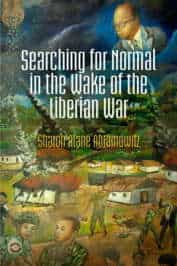 Abramowitz, Sharon Alane. 2014. Searching for Normal in the Wake of the Liberian War. Philadelphia: University of Pennsylvania Press. 280 pp. Hb: $65.00. ISBN: 9780812246261.
Abramowitz, Sharon Alane. 2014. Searching for Normal in the Wake of the Liberian War. Philadelphia: University of Pennsylvania Press. 280 pp. Hb: $65.00. ISBN: 9780812246261.
Searching for Normal in the Wake of the Liberian War explores the human experience of the massive apparatus of trauma-healing and psychosocial interventions during the first five years of postwar reconstruction. Sharon Alane Abramowitz draws on extensive fieldwork among the government officials, humanitarian leaders, and an often-overlooked population of Liberian NGO employees to examine the structure and impact of the mental health care interventions, in particular the ways they were promised to work with peacekeeping and reconstruction, and how the reach and effectiveness of these promises can be measured. From this courageous ethnography emerges a geography of trauma and the ways it shapes the lives of those who give and receive care in postwar Liberia.
 Chakravarti, Sonali. 2014. Sing the Rage. Listening to Anger After Mass Violence. Chicago: University of Chicago Press. 232 pp. Hb: $35.00. ISBN: 9780226119984.
Chakravarti, Sonali. 2014. Sing the Rage. Listening to Anger After Mass Violence. Chicago: University of Chicago Press. 232 pp. Hb: $35.00. ISBN: 9780226119984.
What is the relationship between anger and justice, especially when so much of our moral education has taught us to value the impartial spectator, the cold distance of reason? In Sing the Rage, Sonali Chakravarti wrestles with this question through a careful look at the emotionally charged South African Truth and Reconciliation Commission, which from 1996 to 1998 saw, day after day, individuals taking the stand to speak — to cry, scream, and wail — about the atrocities of apartheid. Uncomfortable and surprising, these public emotional displays, she argues, proved to be of immense value, vital to the success of transitional justice and future political possibilities.
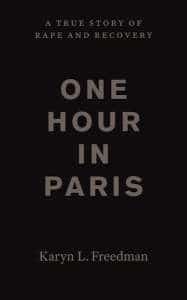 Freedman, Karyn L. 2014. One Hour in Paris. A True Story of Rape and Recovery. Chicago: University of Chicago Press. 208 pp. Hb: $20.00. ISBN: 9780226073705.
Freedman, Karyn L. 2014. One Hour in Paris. A True Story of Rape and Recovery. Chicago: University of Chicago Press. 208 pp. Hb: $20.00. ISBN: 9780226073705.
At once deeply intimate and terrifyingly universal, One Hour in Paris weaves together Freedman’s personal experience with the latest philosophical, neuroscientific, and psychological insights on what it means to live in a body that has been traumatized. Using her background as a philosopher, she looks at the history of psychological trauma and draws on recent theories of posttraumatic stress disorder and neuroplasticity to show how recovery from horrific experiences is possible.
Freedman’s book is an urgent call to face this fundamental social problem head-on, arguing that we cannot continue to ignore the fact that sexual violence against women is rooted in gender inequalities that exist worldwide—and must be addressed.
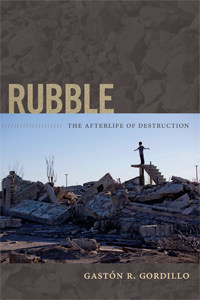 Gordillo, Gastón R. 20134. Rubble: The Afterlife of Destruction. Durham: Duke University Press. 386 pp. Pb: $22.83. ISBN: 9780822356196
Gordillo, Gastón R. 20134. Rubble: The Afterlife of Destruction. Durham: Duke University Press. 386 pp. Pb: $22.83. ISBN: 9780822356196
At the foot of the Argentine Andes, bulldozers are destroying forests and homes to create soy fields in an area already strewn with rubble from previous waves of destruction and violence. Based on ethnographic research in this region where the mountains give way to the Gran Chaco lowlands, Gastón R. Gordillo shows how geographic space is inseparable from the material, historical, and affective ruptures embodied in debris.
Examining the effects of these and other forms of debris on the people living on nearby ranches and farms, and in towns, Gordillo emphasizes that for the rural poor, the rubble left in the wake of capitalist and imperialist endeavors is not romanticized ruin but the material manifestation of the violence and dislocation that created it.
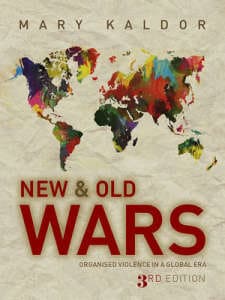 Kaldor, Mary. 2012. New and Old Wars: Organised Violence in a Global Era, 3rd Edition. Cambridge: Polity Press. 224 pp. Pb: €21.60. ISBN: 9780745655635.
Kaldor, Mary. 2012. New and Old Wars: Organised Violence in a Global Era, 3rd Edition. Cambridge: Polity Press. 224 pp. Pb: €21.60. ISBN: 9780745655635.
Mary Kaldor’s New and Old Wars has fundamentally changed the way both scholars and policy-makers understand contemporary war and conflict. In the context of globalization, this path-breaking book has shown that what we think of as war – that is to say, war between states in which the aim is to inflict maximum violence – is becoming an anachronism. In its place is a new type of organized violence or ‘new wars’, which could be described as a mixture of war, organized crime and massive violations of human rights.
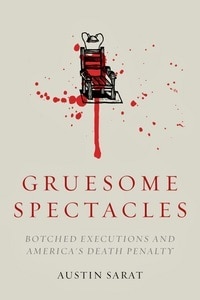 Sarat, Austin. 2014. Gruesome Spectacles. Botched Executions and America’s Death Penalty. Stanford: Stanford University Press. 288 pp. Hb: $24.00. ISBN: 9780804789165.
Sarat, Austin. 2014. Gruesome Spectacles. Botched Executions and America’s Death Penalty. Stanford: Stanford University Press. 288 pp. Hb: $24.00. ISBN: 9780804789165.
Gruesome Spectacles is a history of botched, mismanaged, and painful executions in the U.S. from 1890–2010. Using new research, Sarat traces the evolution of methods of execution that were employed during this time, and were meant to improve on the methods that went before, from hanging or firing squad to electrocution to gas and lethal injection. Even though each of these technologies was developed to “perfect” state killing by decreasing the chance of a cruel death, an estimated three percent of all American executions went awry in one way or another.
Sarat recounts the gripping and truly gruesome stories of some of these deaths—stories obscured by history and to some extent, the popular press.
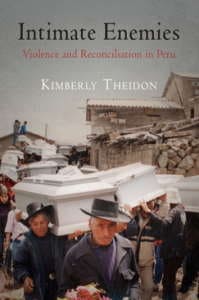 Theidon, Kimberly Susan. 2014.Intimate Enemies: Violence and Reconciliation in Peru. Philadelphia: University of Pennsylvania Press. 480 pp. Pb: $29.95. ISBN: 97808122-2326-2
Theidon, Kimberly Susan. 2014.Intimate Enemies: Violence and Reconciliation in Peru. Philadelphia: University of Pennsylvania Press. 480 pp. Pb: $29.95. ISBN: 97808122-2326-2
Drawing on years of research with communities in the highlands of Ayacucho, Kimberly Theidon explores how Peruvians are rebuilding both individual lives and collective existence following twenty years of armed conflict. Intimate Enemies recounts the stories and dialogues of Peruvian peasants and Theidon’s own experiences to encompass the broad and varied range of conciliatory practices: customary law before and after the war, the practice of arrepentimiento (publicly confessing one’s actions and requesting pardon from one’s peers), a differentiation between forgiveness and reconciliation, and the importance of storytelling to make sense of the past and recreate moral order.
If you are interested in reviewing one of these books, please inform Allegra’s review editor Judith Beyer @ reviews@allegralaboratory.net . Here are our review guidelines:
Spelling: British English. Please use –ise and not –ize word endings.
Word limit: 750-1500 words
Font: Times New Roman
Size: 12
Line Spacing: 1,5
No footnotes.
If you cite other authors, please reference their publication in the end.
The review is to be written within three months from the dispatch of the book.
Please also include your name and (academic) affiliation.
Post header image credit: deviantART user nikogeyer


